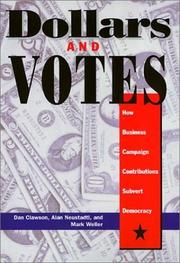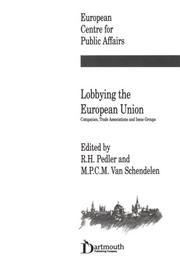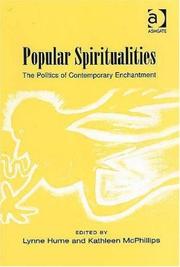| Listing 1 - 10 of 57 | << page >> |
Sort by
|
Periodical
Year: 2002 Publisher: Washington, D.C. : Center for Responsive Politics,
Abstract | Keywords | Export | Availability | Bookmark
 Loading...
Loading...Choose an application
- Reference Manager
- EndNote
- RefWorks (Direct export to RefWorks)
Campaign funds --- Lobbying --- Political action committees --- Campaign funds. --- Lobbying. --- Political action committees. --- United States.
Book
ISBN: 9791036563010 9568416986 Year: 2021 Publisher: Santiago : Ariadna Ediciones,
Abstract | Keywords | Export | Availability | Bookmark
 Loading...
Loading...Choose an application
- Reference Manager
- EndNote
- RefWorks (Direct export to RefWorks)
Las percepciones y los discursos sobre la indianidad marcan un recorrido tan complejo como la evolución de la historia occidental y sus relaciones con América durante cinco siglos. Esos imaginarios -como toda representación colectiva- se han conformado cual amalgamas del ’sentido común’ propio de cada gran periodo histórico de la expansión de los europeos. Estos discursos se han nutrido de las prácticas del sometimiento de los indios, que luego fueron nombrados como indígenas, aborígenes, hasta llegar a los escenarios actuales en que los poderes y las sociedades no-indígenas deben enfrentarla reivindicación del reconocimiento de los pueblos originarios; esto es, en lo fundamental, deben responder ante los derechos colectivos’ formulados y reclamados por tos movimientos indígenas contemporáneos sobre la base de su larga resistencia con el fin de afirmar y reconformar su identidad. En conjunto de cinco ensayos aquí reunidos corresponden a una larga reflexión sobre la condición y realidad mapuche en nuestro país. Todos comparten un contrapunto con la historia, con distintos momentos de nuestra vida política, desde los albores del Estado-nación hasta épocas más actuales, en la perspectiva de augurar cambios y reconocimientos largamente desconocidos.
History --- Cono Sur --- historia diplomática --- relaciones internacionales --- límites y fronteras --- nation --- Mapuche population --- recognition of rights --- indigenous political action

ISBN: 1566396255 1566396263 Year: 1998 Publisher: Philadelphia, Penn : Temple University Press,
Abstract | Keywords | Export | Availability | Bookmark
 Loading...
Loading...Choose an application
- Reference Manager
- EndNote
- RefWorks (Direct export to RefWorks)
Business and politics --- Corporations --- Campaign funds --- Political action committees --- Affaires et politique --- Entreprises --- Caisses électorales --- Political activity --- Activité politique
Book
ISBN: 363137318X Year: 2001 Volume: 423 Publisher: Frankfurt am Main ; New York : P. Lang,
Abstract | Keywords | Export | Availability | Bookmark
 Loading...
Loading...Choose an application
- Reference Manager
- EndNote
- RefWorks (Direct export to RefWorks)
Lobbying --- Pressure groups --- Political action committees --- Business and politics --- Lobbying --- Groupes de pression --- Comités d'action politique --- Affaires et politique

ISBN: 1855216094 Year: 1994 Publisher: Aldershot Dartmouth
Abstract | Keywords | Export | Availability | Bookmark
 Loading...
Loading...Choose an application
- Reference Manager
- EndNote
- RefWorks (Direct export to RefWorks)
Dissertation
ISBN: 2247100104 Year: 2009 Publisher: Paris : Dalloz,
Abstract | Keywords | Export | Availability | Bookmark
 Loading...
Loading...Choose an application
- Reference Manager
- EndNote
- RefWorks (Direct export to RefWorks)
Copyright --- Pressure groups --- Advocacy groups --- Interest groups --- Political interest groups --- Special interest groups (Pressure groups) --- Functional representation --- Political science --- Representative government and representation --- Lobbying --- Policy networks --- Political action committees --- Social control
Book
ISBN: 9819971217 Year: 2024 Publisher: Singapore : Springer Nature Singapore : Imprint: Springer,
Abstract | Keywords | Export | Availability | Bookmark
 Loading...
Loading...Choose an application
- Reference Manager
- EndNote
- RefWorks (Direct export to RefWorks)
This book examines whether Australia’s constitution should be reformed so as to enable the country to fulfil its obligations under the United Nations Declaration on the Rights of Indigenous Peoples, which it ratified in 2009. The book surveys the history of the constitutional status of Australia’s Indigenous peoples from the time of colonisation through to the current debate on ‘Indigenous constitutional recognition’. However, it argues that the term ‘Indigenous constitutional recognition', implying that mere acknowledgement of the existence of Indigenous peoples is sufficient to meet their legitimate expectations, misrepresents the nature of the project the country needs to engage in. The book argues that Australia should instead embark upon a reform programme directed towards substantive, and not merely symbolic, constitutional change. It argues that only by the inclusion in the constitution of enforceable constitutional rightscan the power imbalance between Indigenous Australians and the rest of society be addressed. Taking a comparative approach and drawing upon the experience of other jurisdictions, the book proposes a comprehensive constitutional reform programme, and includes the text of constitutional amendments designed to achieve the realisation of the rights of Australia’s Indigenous peoples. It ends with a call to improve the standard of civics education so as to overcome voter apprehension towards constitutional change. .
Constitutional law --- Indigenous peoples --- Civil rights --- Politics and Government - Political action - Constitutional recognition. --- Constitutional law. --- Public law. --- Human rights. --- Political science. --- Australasia. --- History. --- Race. --- Constitutional Law. --- Public Law. --- Human Rights. --- Governance and Government. --- Australian History. --- Race and Ethnicity Studies.
Book
ISBN: 3839442389 3837642380 Year: 2018 Publisher: Bielefeld transcript Verlag
Abstract | Keywords | Export | Availability | Bookmark
 Loading...
Loading...Choose an application
- Reference Manager
- EndNote
- RefWorks (Direct export to RefWorks)
»Eine andere Welt ist möglich« - so lautet das Credo der Globalisierungskritik, die sich als Gegenbewegung zur neoliberalen Umgestaltung der Welt formiert hat. Darin liegt ein Appell zum politischen Engagement und eine Kritik am Rückzug ins Private, Gemütliche und Überschaubare. Doch auf welcher Erfahrungsbasis beruht dieser Appell? Welche Rolle spielt etwa die Erfahrung der Empörung für die Motivation politischen Handelns? Und lässt sich aus universalem Mitleid ein neues Ethos für eine globalisierte Welt ableiten? Christine Unrau geht diesen Fragen anhand eines mehrdimensionalen Erfahrungsbegriffs nach, der neben Vernunft auch Spiritualität, Emotionalität und Kreativität miteinbezieht. Besprochen in: Fundraiser-Magazin, 4 (2018) Zivilgesellschaft, 2 (2018) Ökologisches Wirtschaften, 1 (2019)
Civil Engagement. --- Civil Society. --- Creativity. --- Emotion. --- Engagement. --- Erfahrung. --- Experience. --- Globalisierung. --- Globalization. --- Kreativität. --- Political Action. --- Political Science. --- Political Sociology. --- Politics. --- Politik. --- Politikwissenschaft. --- Politische Soziologie. --- Politisches Handeln. --- Religion. --- Social Movements. --- Soziale Bewegungen. --- Zivilgesellschaft. --- POLITICAL SCIENCE / Civics & Citizenship. --- Globalisierungskritik; Erfahrung; Engagement; Politisches Handeln; Emotion; Religion; Kreativität; Politikwissenschaft; Zivilgesellschaft; Globalisierung; Politik; Soziale Bewegungen; Politische Soziologie; Globalization Critique; Experience; Civil Engagement; Political Action; Creativity; Political Science; Civil Society; Globalization; Politics; Social Movements; Political Sociology
Book
ISBN: 9781565493278 1565493273 9781565493285 1565493281 9781565493681 1565493680 9781565493698 1565493699 Year: 2011 Publisher: Sterling, VA Kumarian Press
Abstract | Keywords | Export | Availability | Bookmark
 Loading...
Loading...Choose an application
- Reference Manager
- EndNote
- RefWorks (Direct export to RefWorks)
India's vibrant civil society sector has become a powerful symbol of political participation in the country. It comprises a wealth of media organizations, caste and religion based associations, farmers groups, labor unions, social service organizations, and an almost limitless number of development organizations. Given this vibrancy, it is difficult to grasp the characteristics of civil society at the transnational or even the national level. Delving beneath the progressive surface to the local level, one finds a murky and multifaceted world of competing interests, compromises, uneasy alliances and erratic victories. The Politics of Collective Advocacy in India critically examines the enormous gap between the ways collective action in India is studied and the ways it operates "on the ground". It identifies what influences the relative success or failure of different movements; the tools activists use to overcome obstacles; the traps that derail efforts to frame, politicize, and act on certain issues and assumptions about particular forms of action. The authors synthesize the experiences of a number of organizations and movements to identify the most effective tools that civil society actors at all levels can use to achieve positive social change.
Pressure groups --- Political activists --- Groupes de pression --- Activistes --- Activists, Political --- Advocacy groups --- Interest groups --- Political interest groups --- Special interest groups (Pressure groups) --- Political participation --- Functional representation --- Political science --- Representative government and representation --- Lobbying --- Policy networks --- Political action committees --- Social control --- Persons

ISBN: 0754639991 9780754639992 Year: 2006 Publisher: Aldershot, Hants Ashgate Publishing Limited
Abstract | Keywords | Export | Availability | Bookmark
 Loading...
Loading...Choose an application
- Reference Manager
- EndNote
- RefWorks (Direct export to RefWorks)
Cults --- Spirituality --- Religion and politics --- Popular culture --- Cultes --- Spiritualité --- Religion et politique --- Culture populaire --- Religious aspects --- Aspect religieux --- Cults. --- Spirituality. --- Religion and politics. --- Religious aspects. --- Spiritualité --- Popular culture - Religious aspects. --- postmodernity --- popular forms of spirituality --- re-enchantment --- popular culture --- political activism --- quasi-religious groups --- Political action --- eco-paganism --- postcolonial youth culture --- alternative health movements --- social change --- Goddess
| Listing 1 - 10 of 57 | << page >> |
Sort by
|

 Search
Search Feedback
Feedback About UniCat
About UniCat  Help
Help News
News